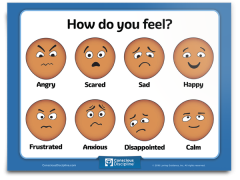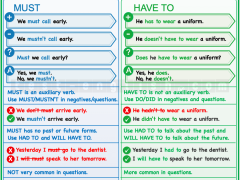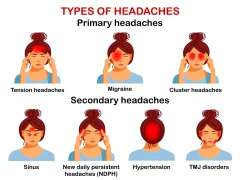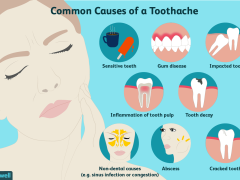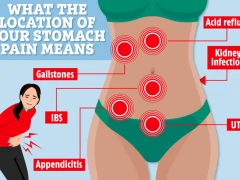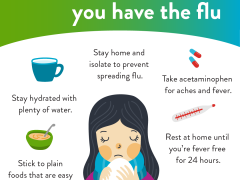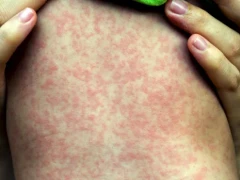feel [fiːl] v. 感觉
【派】feeling 感情,感受
【搭】feel as if 觉得 feel about 摸索
* * *
A: What do you feel about your roommate?
B: He is easy to get along with.
A:你的室友怎么样?
B:他很容易相处。
* * *
look [luk] v. 看(起来)
【扩】see 看见 stare 凝视
【搭】look at 看 look after 照顾
look for 寻找 look out 小心
* * *
A: You look so young.
B: But I am forty years old now.
A:您看上去很年轻。
B:但是我现在已经40岁了。
* * *
must [mʌst] modal verb 必须
call [kɔːl] v. 叫,请
【派】caller 呼喊者
【扩】invite 邀请,叫
【搭】call back 回电话 call for 要求
call in 邀请 call off 取消
* * *
A: I'm glad to see you here, Mr. Hill.
B: Please call me Jack.
A:在这儿见到你我很高兴,希尔先生。
B:请叫我杰克。
* * *
doctor [ˈdɔktə] n. 医生
【搭】see the doctor 看病
the doctor's 医生办公室
* * *
A: I feel so bad.
B: I advise you to see a doctor.
A:我感觉很难受。
B:我劝你去看看医生吧。
* * *
telephone [ˈtelifəun] n. 电话
【搭】on the telephone 在接电话
telephone call 电话
* * *
A: Did he leave his telephone number?
B: Yes, I have written it down on the paper.
A:他留下电话号码了吗?
B:是的,我把它写在这张纸上了。
* * *
remember [riˈmembə] v. 记得,记住
【派】rememberable 可回忆的
【扩】keep in mind 记得 think of 想起
【反】forget 忘记
【搭】remember of 想起
* * *
A: I shall not do it again, I promise.
B: I don't remember how many times you have promised.
A:我承诺以后不会再那样做了。
B:我记不清你已经承诺过多少次了。
* * *
mouth [mauθ] n. 嘴
【派】mouthful 满口 mouthwash 漱口水
【搭】mouth to mouth 口对口的 a big mouth 说大话的人
* * *
A: Put a handkerchief over your mouth when you sneeze.
B: OK. I will do it like that next time.
A:打喷嚏时用手帕捂住嘴。
B:好的,我下次会记住的。
* * *
tongue [tʌŋ] n. 舌头
* * *
A: It's very hot today.
B: Yes. Look, the dog is lolling its tongue out.
A:今天真热啊。
B:是啊。看,那狗把舌头伸出来了。
* * *
bad [bæd] adj. 坏的,严重的
cold [kəuld] n. 感冒
【派】coldness 冷
【搭】a bad cold 重感冒
catch a cold 感冒
* * *
A: I've caught a cold.
B: Is it because of the bad weather?
A:我感冒了。
B:是因为天气不好吗?
* * *
news [njuːz] n. 消息
Lesson 62 What's the matter with them? 他们怎么啦?
What must they do? 他们该怎么办?
headache [ˈhedeik] n. 头痛
【构】head(头)+ache(痛)=headache(头痛)
【扩】dizzy 头晕的 giddy 头晕的
* * *
A: I have a splitting headache.
B: Have you been to the doctor's?
A:我的头像要裂开似地疼。
B:你去看医生了吗?
* * *
aspirin [ˈæspərin] n. 阿斯匹林
* * *
A: What do you keep inside the kit?
B: There are medicines such as Aspirin, vicks, Dristan, etc.
A:你那急救箱里都放些什么?
B:里面有许多药品,比如阿司匹林、去痛片、头痛药等等。
* * *
earache [ˈiəreik] n. 耳痛
toothache [ˈtuːθeik] n. 牙痛
* * *
A: The toothache is killing me.
B: When did it start?
A:我的牙疼死了。
B:什么时候开始的?
* * *
dentist [ˈdentist] n. 牙医
* * *
A: Why do you want to change your day off?
B: I have to go to the dentist's this Wednesday.
A:你为什么想调休息日呢?
B:星期三我得去看牙。
* * *
stomachache [ˈstʌmək-eik] n. 胃痛
* * *
A: Shall we go swimming?
B: If you swim on a full stomach, you will have a stomachache.
A:我们去游泳吧?
B:吃饱了游泳,你会肚子疼。
* * *
medicine [ˈmedisin] n. 药
【扩】pill 药丸 tablet 药片
【搭】take medicine 吃药
* * *
A: What do you advise me to do, doctor?
B: Take this prescription to the dispensary for the medicine.
A:大夫,你说我该怎么办?
B:你拿这个药方去药房买药。
* * *
temperature [ˈtemp(ə)ritʃə] n. 温度
【扩】clinical thermometer 体温计
【搭】take one's temperature 量体温
run a temperature 发烧
* * *
A: Have you taken your temperature?
B: Yes, I have got a fever.
A:你量体温了吗?
B:是的,我发烧了。
* * *
flu [fluː] n. 流行性感冒
* * *
A: I think you've caught the flu.
B: Yes, after taking the medicine, I'll go to bed right away.
A:我看你是得了流感。
B:是的,吃完药我马上上床休息。
* * *
measles [ˈmiːzəlz] n. 麻疹
mumps [mʌmps] n. 腮腺炎
verb [vt. 及物动词]感受到,体会到;觉得,相信;使人感觉…;察觉到,意识到;触摸;受到;摸索;有知觉,能感知… - I feel dizzy and disorientated.
noun [抽象名词]感觉,气氛;触觉,手感;触摸;感知,理解;熟练使用;特性,特质 - The heat made him feel faint.
verb [vi. 不及物动词]看;故意不理睬(某人),装作没有看见(某人)(look through);寻找(look for);注意;与…外表相似;看起来像(look like);面向;检查,查看(以采取相应措施)(look at);打算(look to) - I looked down the hallway to room number nine.
noun [抽象名词]看;寻找,搜索;表情,神色;景象,样子;容貌(looks);风格,样式;察看,考虑 - Lucille took a last look in the mirror.
verb [情态动词](表示必要或很重要)必须;(用于表示肯定推测)一定,谅必;(提出建议)应该;(用于表示意图)一定要,坚持要;(用于表示同情)必定;(用于问句中表示生气)非要 ;(用于感叹句,表示惊讶或震惊)一定是 - You use must to indicate that it is necessary for something to happen, usually because of a rule or law.
noun [抽象名词]<非正式>必不可少的事物;(发酵前或发酵中的)葡萄汁;潮气,霉菌;(尤指发情期的公象、雄骆驼等的)狂暴状态(=musth) - If you refer to something as a must, you mean that it is absolutely necessary.
verb [vt. 及物动词]给…取名;称呼,把…唤作;把…看作,把…算作;呼喊(某人),喊,叫;安排,召集;召唤,呼唤;传唤(证人);(给…)打电话;打电话叫…来;点(名),从(清单上)读出;(通过广播)呼叫(飞机乘客登机);感召,敦促;批评,辱骂;(动物)啼叫,鸣叫;(模仿动物的叫声)把…引过来;(尤指短暂的)拜访,造访;(火车、船、公共汽车等)短暂停留;预测,推测 - I always wanted to call the dog Mufty for some reason.
noun [抽象名词]打电话,通话;喊叫,呼叫;(鸟或动物的)叫声;短暂拜访,访问;号召,呼吁;需求,需要;需要关注或努力的事;召唤,使命感;吸引力,魅力;登机广播,登机(上车)通知;(做某事的)号声;模仿(鸟、兽)的叫声;模仿鸟叫声的哨子; 决定,抉择 - If there is little or no call for something, very few people want it to be done or provided.
vt.&vi. 叫,喊
- I heard someone calling.
- call out = shout 大声喊
vt. 呼唤,召唤
- Lucy is sick. Please call a doctor.
vi. 访问,拜访;(车、船等)停靠
- Amy called (at our house) yesterday.
- The train calls at large stations only. 这列火车只停大站。
call on sb. 拜访某人
- I will call on you. 我要去你家。
- He calls on his grandfather every week.
call at+地点=visit someplace 拜访某地
- I will call at your home. 我要去你家。
- He calls at every house in the street once a month.
vt.&vi. 打电话
call sb = call up sb. 给某人打电话
- call back 回某人电话
- Can you take a message for me? = Can you tell him to call back?
call in sb. 招集和邀请某人
- For the project, the government called in a lot of experts.
noun [具体名词]医生,大夫;诊所(the doctor);博士;<美>牙医,兽医 (Dr);博学的人;(钓鱼用)人造蝇;凉爽海风;<俚>船上的厨师 - Do not discontinue the treatment without consulting your doctor.
verb [vi. 不及物动词]篡改,伪造;将有害物掺入(食物或饮料)中;阉割(动物);为…治病,给…疗伤;授以博士学位;修理(机器等),修复;当医生,行医 - They doctored the prints, deepening the lines to make her look as awful as possible.
noun [专属名词]电话通讯系统;电话;(电话机的)话筒,受话器 - He snatched up the telephone.
verb [vt. 及物动词](给…)打电话 - I must telephone my parents.
call sb. phone
sb. give sb. a call
I’m going to see you tomorrow, but in any event ,I'll phone/I’ll call/give you a call. 明天我来看你,万一我来不了,我会打电话的。
verb [vi. 不及物动词]回想起,记得;记起,忆起(某事物);记牢,不忘记;纪念,缅怀;(祈祷时)为......祝福;送钱,送礼(给某人);代(某人)问候(某人);(失态后)检点,补救 - You wouldn't remember me. I was in another group.
noun [具体名词]嘴,口腔;需要供养的人,食客;入口,开口;入海口,河口;讲话方式,言谈 - She clamped her hand against her mouth.
verb [vi. 不及物动词]不出声地说,用口型默示;言不由衷地说;发…的音;吃,用嘴触碰 - If you say that someone does not open their mouth, you are emphasizing that they never say anything at all.
noun [专属名词]舌,舌头;(供食用的动物的)舌头,口条;语言,方言;说话方式,写作风格;鞋舌;舌状物;(延伸入湖、海等中的)长条状陆地,舌状陆地;榫舌,雄榫;(脊椎动物的)齿舌;(昆虫的)喙;钟锤;(乐器、风琴管的)簧片;搭扣销 - I walked over to the mirror and stuck my tongue out.
verb [vi. 不及物动词]用运舌法吹奏(管乐器);用舌头触碰,舔;说话;<旧>斥责 - The dog's tongue was hanging out.
adjective [原级]坏的,不好的,令人不悦的;难以接受的,令人遗憾的;粗鲁的,下流的;抱歉的,难过的;质量差的,不合格的;邪恶的,不道德的;顽皮的,不乖的;有病的,疼痛的;腐烂的,变质的;严重的,剧烈的;不明智的,不合适的;不利的,不幸的;拙于,不擅;无价值的,伪造的 - The bad weather conditions prevented the plane from landing.
noun [抽象名词]坏人,坏事 - The report blames bad management.
adverb [方式副词]<美,非正式>很,非常;<美,非正式>厉害地 - 'Not bad,' she conceded grudgingly. “
adjective [原级]冷的,凉的;冷淡的,冷漠的;冷色调的;已变淡的;失去知觉的;真实的,客观的;扫兴的,灰蒙蒙的;远未猜中的 - The day was cold and blustery.
noun [专属名词]感冒,伤风;寒冷,低温 - I had a stinking cold.
adverb [方式副词]突然地,彻底地;毫无准备地 - He looked at her coldly, refusing to show any emotion.
noun [专属名词]消息,新情况;新闻(报道);新闻人物,新闻事件;电视新闻节目(the news);(用于报纸名)新闻 - The news heartened everybody.
noun [抽象名词]头痛;使人头痛的事,难题 - Red wine gives me a headache.
noun [专属名词]阿司匹林(解热镇痛药) - Aspirin is a mild analgesic.
noun [专属名词]耳朵痛,耳痛 - He had an earache and a fever.
noun [专属名词][口腔] 牙痛 - He's got a toothache.
noun [专属名词]牙科医生;牙医诊所 - I have to go to the dentist tomorrow.
noun [专属名词]胃疼 - Why Does Mousy Have a Stomach ache?
noun [物质名词]药物,药剂;医疗,医学;内科;(北美印第安人等民族所信奉的具有治疗或保护效力的)咒语,魔法 - Medicine is a substance that you drink or swallow in order to cure an illness.
verb [vi. 不及物动词]用药物治疗,给…用药 - Research into LSD is not confined to medicine.
noun [专属名词]温度,气温;体温;发烧;热烈程度,情绪激烈程度 - Her temperature is normal.
noun [专属名词]流行性感冒,流感 - I was stuck at home with flu.
noun [专属名词]麻疹,风疹;(家畜)囊尾蚴病 - Adults are often immune to German measles.
noun [专属名词][内科] 流行性腮腺炎;愠怒;生气 - "Remember mumps," he warned her almost threateningly, and off he went again. “
noun [专属名词]药店;(医院的)药房,配药室;药剂学,配药学;一批备用药品 - He spent four years studying pharmacy.
